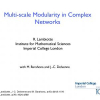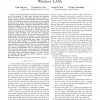140
click to vote
WIOPT
2010
IEEE
15 years 14 days ago
2010
IEEE
—Opportunistic forwarding is a simple scheme for packet routing in ad hoc wireless networks such as duty cycling sensor networks in which reducing energy consumption is a princip...
WIOPT
2010
IEEE
15 years 14 days ago
2010
IEEE
127
click to vote
WIOPT
2010
IEEE
15 years 14 days ago
2010
IEEE
— By analyzing people’s contact patterns over time, it is possible to build efficient delay tolerant networking (DTN) algorithms and derive important data for parameterizing an...
140
click to vote
WIOPT
2010
IEEE
15 years 14 days ago
2010
IEEE
—Conventional wisdom about 802.11 WLANs dictates that as the number of active users increases, the contention windows (CW) of all the contending users needs to increase to preven...
110
click to vote
WIOPT
2010
IEEE
15 years 14 days ago
2010
IEEE
—Revocation of public-key certificates is an important security primitive. In this paper, we design a fully distributed local certificate revocation scheme for ephemeral networ...
142
click to vote
WIOPT
2010
IEEE
15 years 14 days ago
2010
IEEE
—The nodes in wireless sensor networks often collect correlated measurements. Not taking into account this information redundancy is detrimental to the network lifetime, since co...
118
click to vote
WIOPT
2010
IEEE
15 years 14 days ago
2010
IEEE
—In this paper, we explore physical layer cooperative communication in order to design network layer routing algorithms that are energy efficient. We assume each node in the net...
142
click to vote
WIOPT
2010
IEEE
15 years 14 days ago
2010
IEEE
—Cognitive radio networks provide the capability to share the wireless channel with licensed (primary) users in an opportunistic manner. Primary users have a license to operate i...
101
click to vote
WIOPT
2010
IEEE
15 years 14 days ago
2010
IEEE
—In distributed network settings, where nodes are not under the control of a single administrative entity, the fulfillment of fundamental network operations is heavily dependent...
104
click to vote
WIOPT
2010
IEEE
15 years 14 days ago
2010
IEEE
In this paper, we propose a comprehensive probabilistic framework which can be used to model and analyze cognitive radio (CR) network using carrier sensing (CS) based multiple acc...


